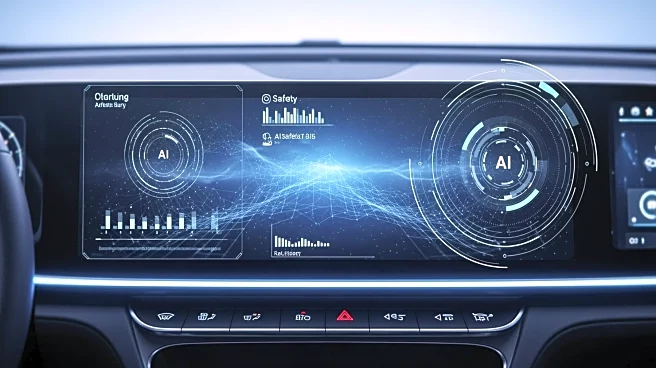What's Happening?
Nexar has introduced BADAS (Beyond ADAS), an advanced AI model designed to improve vehicle safety and autonomy. This model is trained on over 10 billion miles of real-world driving data collected from
Nexar's global sensor network, which includes more than 350,000 connected devices. BADAS aims to predict road incidents and driver behaviors more accurately than models trained solely on simulations. The model leverages Nexar's extensive data network to anticipate road events, rather than merely reacting to visible situations. According to Zach Greenberger, Chief Executive of Nexar, BADAS represents a significant step in transforming raw road data into deployable AI infrastructure, enhancing safety and autonomy in mobility solutions.
Why It's Important?
The introduction of BADAS by Nexar marks a pivotal advancement in vehicle safety technology. By utilizing real-world driving data, Nexar's model addresses the limitations of traditional simulation-based approaches, which often fail to capture the full spectrum of human driving behaviors. This development is crucial for the automotive industry as it seeks to enhance safety measures and reduce road incidents. The model's ability to continuously adapt and improve its understanding of driving scenarios could lead to significant reductions in accidents and improve overall road safety. Stakeholders in the mobility sector, including vehicle manufacturers and technology providers, stand to benefit from the enhanced predictive capabilities and behavioral insights offered by BADAS.
What's Next?
Nexar plans to further develop BADAS by expanding its sensor network and refining its AI infrastructure. As the model continues to capture new driving scenarios, it will adapt and improve its predictive accuracy. This ongoing development could lead to broader adoption of BADAS across various mobility platforms, potentially influencing industry standards for vehicle safety and autonomy. Nexar's interactive driving simulation, which demonstrates BADAS's real-time response capabilities, may serve as a tool for stakeholders to evaluate and integrate the model into their systems. The company's focus on real-world data as a foundation for AI development may inspire similar approaches in the industry, driving innovation in vehicle safety technologies.
Beyond the Headlines
The deployment of BADAS highlights the ethical and practical considerations of using real-world data in AI development. By prioritizing real-world driving behaviors, Nexar addresses the unpredictability and diversity of human actions on the road, which simulations often overlook. This approach raises questions about data privacy and the ethical use of sensor networks, as well as the potential for AI to transform mobility infrastructure. The long-term implications of BADAS could include shifts in regulatory standards and the integration of AI-driven safety measures in urban planning and transportation systems.









